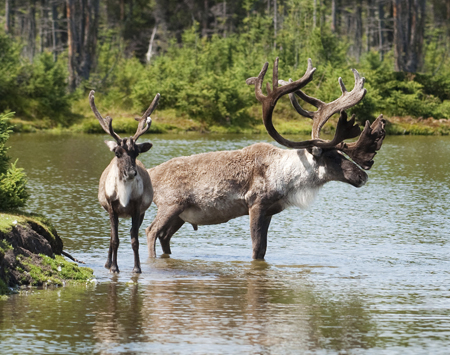Today one of our Canadian partner organizations, the Canadian Parks and Wilderness Society (CPAWS), delivered more than 32,000 signatures to Canadian parliament asking them to better protect the increasingly-threatened woodland caribou. These signatures were delivered just a week before the end of the public comment period on the federal government’s national caribou recovery strategy, which many feel still has major shortcomings.

'Bou' with CPAWS National Executive Director Éric Hébert-Daly.
Credit: CPAWS
Woodland caribou have become an icon in Canada as both a symbol of the rugged wilderness and as a face of the damage that has been going on in their boreal forest habitat. Woodland caribou numbers exceeded 100,000 just decades ago, but now that figure is believed to have dropped to below 40,000. While this number may seem larger than some endangered species in other parts of the world, you have to realize that these caribou are spread throughout much of Canada—the second largest country on earth—and that they belong to individual herds that rarely mix. They’ve been decreasing dramatically in almost every province, with habitat loss and degradation being the leading cause for this rapid decline. In fact, they’ve lost around half of their historic range overall, primarily in the south where industrial activity is the most prevalent.
The importance of preserving woodland caribou goes beyond the simple beauty of the magnificent creatures. Aboriginal peoples in Canada’s boreal forest have been relying on caribou as a source of clothing, tents, food, and tools, for thousands of years, and this creature plays an important spiritual role for many of these groups. Because the health of caribou populations is so intricately linked to the overall health of their boreal habitat, they are seen as indicators of the health of the environment at large.

Woodland caribou are of great importance to many Aboriginal groups.
Credit: Howard Sandler
Most Canadians care about woodland caribou, whether it be a business urbanite or a lodge director in the heart of caribou habitat. They want and demand that science, not politics, is in the driver’s seat for this important recovery strategy.
In current form, the draft strategy seems like a mixed bag. It does provide protection measures for some herds, but wouldn’t require immediate action for nearly half of Canada’s herds overall. In some cases, the plan focuses completely on killing predators like wolves to save the most at-risk herds but requires no habitat restoration—the only viable solution to maintaining the most at-risk herds over the long-term.
We thank CPAWS for putting this petition together and for the 32,000 people who signed it. We hope this message resonates with Canadian officials and they use the great opportunity in front of them to improve their national strategy to allow all caribou herds the best chance at survival.

